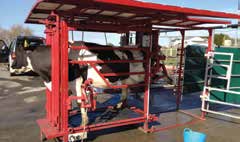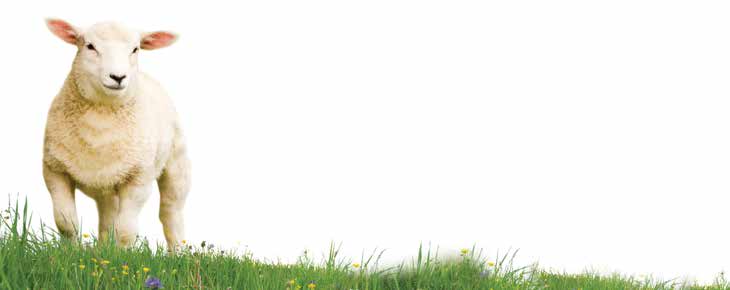Franklinvets.co.nz



An extreme
for facial
The facial eczema fungus Pithomyces chartarum requires warm
supplementation when spores are detected,
night time temperatures (>12 deg C), humidity, and dead matter
with full levels once spore reach 30,000.
to multiply. With recent rain and incredibly humid conditions,
Spore counts are made from very small
things are lined up for a particularly bad FE season this year.
samples of grass from many hectares of
Whilst it is great to see farms looking green with good pasture
land. Counts can vary significantly between
covers for the time of year, when you are growing grass in mid-
paddocks on one farm and even more
summer, you are probably growing spores too!
between farms from a region. Therefore, it is far better to do counts on your farm rather than rely on neighbours counts.
If you are not going to test grass from your farm, when any counts over 20-30,000 are
Jason Fayers
recorded from your region, it is advisable
BVM&S CertCHP
to start prevention.
Go to our website www.franklinvets.co.nz for weekly updates of
counts in your region.
How do I know if my stock are protected?
Recent work by Dr Emma Cuttance, (a vet based in Te Awamutu),
funded by Dairy NZ, has shown that many dairy cows being
treated with zinc are failing to achieve protective levels of zinc in
the blood stream. In her study, only 28% of cows from 106 farms
had adequate levels. The graph below shows the results, with the
protective level marked by the red dotted lines.
Historical trends- (source Assure-Quality)
In this study, only farms that were drenching stock with zinc,
As can be seen on the above graph, spore counts are well above
providing zinc oxide on feed or a combination of zinc on feed and
challenge levels already, (week 7 is the 29th of February) and
in water achieved protective levels. In high challenge situations,
placed to get worse, with counts likely to be remaining high out
water treatment alone is unlikely to be very effective.
until late April/ early May.
If your stock are likely to be facing significant spore challenge, we
We commonly see farmers finishing their Zinc too early with
therefore recommend blood testing stock to check levels, and
animals getting exposure and liver damage/ FE signs at the end of
adjusting supplementation as required.
the season, so keep protection going well into May.
Remember facial eczema is a ‘tip of the iceberg' disease and if you
When should I start prevention?
are seeing any clinical cases, there will be plenty of sub-clinically affected animals in the mob too, limiting production/ growth rates.
All stock should now be on full levels of Zinc, if you are not
Monitoring effectiveness by the presence or absence of cows with
pasture spraying with fungacide. For future years, the best
peeling skin is not a good idea in high challenge years.
advice is to monitor spore counts on your farm and start zinc
Article continued on page 3.




What do you want from your dry cow?
As the summer rolls on, you are probably starting to think about drying off some of your cows. The vast majority of farmers now use whole-herd dry-cow therapy as an integral part of their mastitis-control strategy. However, like all things in the current
Teatseal is a non-antibiotic inert substance
economic environment, it is often useful to review farm practices
that forms a plug in the teat canal,
and re-evaluate why we do things and what we are trying to
preventing mastitis throughout the entire
dry period and at calving. Adding Teatseal to your dry cow programme provides
The three main goals of dry-cow therapy are to:
protection against new infections right up
1. Cure existing high-cell-count cows
to calving, and is proven to reduce mastitis
2. Prevent new infections at drying off
by 30%-50% right into mid lactation.
3. Reduce mastitis at calving and in early lactation
David Hawkins,
While Teatseal is a great product and
Farm Services Vet and
For the first goal of curing existing infections, all dry-cow products provides great mastitis protection, it does
have good efficacy against the common mastitis bacteria.
require very high levels of hygiene when inserting the product
The main difference between products is the duration of activity,
(especially when using without an antibiotic). Combination therapy
with longer acting products generally giving slightly higher cure
with a antibiotic is the gold standard, and if you wish to use it
rates, particularly to cows infected with Staph aureus.
without an antibiotic, you will need enough information (such as recent herd test within 80 days) to ensure cows you are treating
Remember: Administering the right dry-cow product at drying are uninfected. We have strict criteria that must be fulfilled in
off is your best opportunity to reset the clock for your herd's
order to prescribe teaseal alone, so talk to you vet to see if it is
somatic cell count!
Prevention of new infections at drying off depends on the involution of the udder from a lactating to dry state, and formation of a keratin teat plug. It has been clearly shown that the natural formation of a keratin teat plug, which forms a physical
To decide the best strategy for your farm, make sure you bring
barrier at the teat end, has a big effect in reducing bacteria getting
along as much information as you can to your annual health review
into the udder after drying off. 97% of infections that occur during
with your vet. This is one area where Infovet is a very powerful
the dry period occur in quarters that have not formed a keratin
tool in making the best dry-cow therapy choices for your herd.
plug. The speed at which different cows form a keratin teat plug is very variable. At one week post-dry-off, approximately 50%
As always, prevention
of cows have not developed this plug and at six weeks about a
is better than cure,
quarter of cows still don't have a keratin plug.
and choosing the right
Many of the infections that cause mastitis over the calving period
dry-cow products is
or in early lactation were actually picked up during the dry period.
an investment in the
These bacteria have the ability to infect the udder pre-calving and
udder health of your
sit there dormant for up to 100 days before they cause clinical
herd for next season!
mastitis. Up to 56% of Strep mastitis cases after calving were
found to be due to infection during the dry period.
choice at drying off
All dry-cow antibiotics provide protection for at least four weeks
can have a big impact
against infection after drying off. Studies have also shown that the
use of dry-cow speeds up the formation of the keratin teat plug.
Another very effective option is to mimic the keratin plug using
experience in the
Why do lame cows always crop
up at the busiest time of year?
Let Franklin Vets mobile lameness service help you through
the toughest part of the season!
•
Early and effective treatment reduces production loss and weight loss and get cows back in the herd sooner.
Mobile crush and use of angle grinders allows
Dairy Hoof Care
economically priced handling of larger numbers of lame cows
Fee ex GST
Free up farm staff to do those other important jobs
Standard per cow fee (both back feet or single front foot) $17.50
that they are good at and enjoy!
Premium lameness and trim (all 4 feet)
Apply block (includes fee, wooden block and glue)
Call your local Franklin Vets clinic for more
information or get in early and book a free
Minimum fee (including set up)
All prices ex GST

. Facial eczema article continued from page 1.
What about dry
stock?
As the graph
shows, if it is hard
to get protective
levels of zinc into
dairy cows (with
high water intakes
per kg of body
weight) it is nigh
on impossible to
achieve protective
levels in growing
calves and heifers of beef animals. This was backed up by a 3-year
Beef and Lamb study that Franklin Vets was involved in with clients
Steve and Sandra Parrot that showed water treatment alone was
a very unreliable method for protecting against facial eczema, and
showed the best options for protection were Zinc boluses and
fungicidal spray. For more information, search "Facial eczema" on
the beef and lamb website
Use of capsules such as the Face-Guard boluses is the most
practical and sure fire way of protecting dry stock.
Remember, a 10% gap in live weight at calving for a dairy heifer
costs $100 in lost production/ reproductive performance. If calves
and heifers are light due to FE damage, the cost could be way
more due to ongoing effects of liver damage. In the Beef and Lamb
study, there was a 40 kg difference in Liveweight gain between
treated and untreated, which was easily enough to cover the cost
treatments, even in a mild eczema season.
Sudden Death in Lambs
Despite the best of efforts to keep lambs
parasite in BZ and Ivermectin drenches
mustering and
alive, Summer and Autumn is always a
is quite concerning. By using effective
yarding from this
difficult time for lambs. Lately we have
drenches with persistent activity, we can
age until the next
been getting some reports of sudden
prevent the adults multiplying and larvae
winter. A conscious
death in apparently healthy lambs. It is
consuming vast quantities of precious
decision must be
usually one of three things; Barbers Pole,
blood. By the time anaemic, sluggish lambs
are noticed it is likely some of the group
Pneumonia or Clostridial disease. All three
lambs are mustered
can be prevented to varying degrees.
as to whether it
Mark Hosking
Pneumonia can be grouped into two
is necessary. This
BVSc, MBA(dist), MACVSc
Barbers Pole worm, or more correctly
different diseases depending somewhat
referred to as Haemonchus contortus, is a
on the outcome. A chronic form of
treatments and keeping the minutes spent
well known blood sucking parasite in this
pneumonia causes lung damage and is
in dusty yards to a minimum. Ideally yards
area. In fact the level of resistance to this
often reported as pleurisy at the works in
will be sprinkled first and mustering will
apparently healthy lambs. In others that
take place in the early morning.
have had little previous exposure to the
Clostridial Diseases. Lastly and the
bugs involved, or have been under stress,
most easily preventable disease is the
the outcome can be rapidly fatal with little
group of Clostridial diseases. These
warning. A group of viruses and bacteria
diseases are often forgotten about but
work in synergy to cause massive damage
can cause random deaths in healthy
to the lungs that overcomes the lamb. The
fast growing lambs, especially on crops.
only real way of dealing with both forms is
Remember that the antibody protection
from pre lamb vaccinated ewes will provide
Prevention starts very early in the lamb's
no more than 14 weeks protection in lambs.
life as most of the bugs are present at this
After this they need two 5'n'1 or 6'n'1
stage. There is a vaccine available that is
vaccines to provide prolonged protection.
useful to prevent some of the causative
It is strongly recommended that this
bacteria but needs to be started as early
be done to all replacement ewe and
as docking. Prevention involves limiting
fattening lambs.
A Breakthrough
in the Treatment
of Itchy Dogs
Almost every day throughout the spring and summer
sometimes develop wet, infected areas of
months we treat dogs with one of many skin complaints
skin commonly known as Hot Spots.
that cause dogs to scratch. Itching is most commonly the result of
The problem with all these allergies is it is
a dog suffering one or more allergies.
often difficult to identify the exact cause of
The allergies responsible for making dogs itchy are typically one of the allergy and even more difficult to stop the following:
your dog being exposed to an environment
• Flea allergy (even one flea can cause this),
that creates all the itchiness. What we can do, and try to do, is stop the itch - and
• Food allergy,
up until now we have used a variety of,
• Contact allergy (when your dog comes into direct contact
and usually a combination of, treatments;
with something which triggers the itch),
prednisone, antibiotics, creams, sprays and
Phil MacLeod
• Atopic dermatitis (itchy skin disease associated
BVSc MANZCVS
with environmental allergens e.g. pollens, moulds or
The great news is we now have a new treatment recommendation
house-dust mites).
available: APOQUEL® is specifically designed to rapidly control
And being itchy does not mean just scratching. In addition to
the itching and inflammation associated with allergic skin disease.
scratching, itchy dogs may;
IT JUST STOPS ITCHING.
• Lick excessively,
APOQUEL acts fast and reduces itch on the first day, providing
• Rub their face along the furniture and carpet,
effective and sustained itch relief for your dog. It is well tolerated
• Roll around on their backs,
with fewer short and long-term side effects compared to steroids (the current most common treatment prescribed by vets).
• Drag themselves along the ground,• Shake their heads,
Talk to us today if you are concerned about your dog's excessive itching. Help restore the quality of life for your dog and you with
• Some itchy dogs may just be paw lickers and not actually
APOQUEL. (Note: Apoquel is available only under a Veterinary
scratch that much.
prescription following a consultation).
The problem with all this scratching, licking and rubbing is that it
We can assess how appropriate Apoquel is for your dog. This may
causes damage to an already inflamed skin, which in turn increases
include examining your dog's skin, checking for infections, checking
the level of itchiness and discomfort.
for any current flea and parasite issues, and discussing any side
Persistently itchy dogs often have skin which is red, scaly and
effects of Apoquel that may affect them, so contact us to book an
smelly, fur loss, as well as areas of darkened skin. They can also
12-week flea and tick protection
0 worries
Staff update
Our Pukekohe Farm Tech,
Ryegrass staggers
Emily Roose and Pukekohe
Vet Ilyse Jennens both
head off on maternity leave
in horses
this month, but have both promised to be returning to us
Ilyse Jennens
later this year. Our best wishes to both of them for their upcoming adventures!
Ryegrass staggers is a nervous disease of horses, sheep, cattle, deer and alpacas and it is commonly
"Hi everyone, Emily here; well
seen during the summer and autumn period.
the time has come for me to
Ryegrass staggers comes from ingesting a chemical
head off for a spell. So I'll leave
called Lolitrem B, which is produced by an
you in Sophie's capable hands.
endophyte found in most ryegrass plants. These
Watch this space for news of
endophytes help protect the plant against insect
Katie Kindleysides BVSc
Emily Roose
my new arrival. See you all in
damage, however the chemicals they produce can
also cause heat stress and staggers in animals. Many of the newer varieties of Ryegrass sold now contain AR7, or NEA2 endophytes which have no, or
Whilst Emily is away, we have
very low levels of Lolitrem B, but still offer protection against insect damage.
Sophie Hamilton covering
her technician duties. Sophie
Horses grazing ryegrass with the standard endophyte are most at risk of
is a qualified Vet Tech, who
staggers when grazing the base of plants in dry summers or grazing the first green growth following a dry period, because this is where Lolitrem
has been working with our
B is most concentrated. Lolitrem B is also found in seed heads, so rank,
Companion Animal reception
seedy pasture (such as we are seeing now) is also a risk. Clinical Signs: Most
Sophie Hamilton
team in Pukekohe, before
animals appear normal until disturbed and made to walk or run at which
joining the farm team to
stage they start displaying symptoms. Clinical signs include head nodding
and jerky limb movements. This results in staggering during moving or when
"Hi everyone, for those of you
worse, short prancing steps.
who I have not yet met my
With horses, the first sign their owners normally see is a nervous or
name is Sophie and I will be
frequent shying horse. This can progress to unsteadiness and loss of balance
filling in for Emily whilst she is on
when walking. This can progress further to the same signs as sheep. Some
maternity leave.
horses can be very susceptible to staggers, and differences can be seen between two horses grazing the same pasture. Overall there is a variety of
I am originally from the South
behavioural changes that may result from the staggers chemical.
Island where I studied rural animal technician through Lincoln
While it is unlikely to be fatal by itself, ryegrass staggers commonly results
University's campus in Southland.
in misadventure and can cause death for instance due to drowning in dams
I was raised on a farm in the
or electrocution in electric fences.
east coast of the South Island
While other species recover (a few days to a few weeks) once they have
and now live on a sheep and
been removed from Ryegrass pasture, horses can take months to recover,
beef farm with my partner. I am
so it pays to be proactive with your prevention.
thoroughly enjoying working at
Franklin Vets and look forward to meeting you soon."
1. Add a mycotoxin binder such as EquiGuard Plus™ to horse feed.
Goran Medic from our
2. Try to graze pasture which is not predominately endophyte ryegrass,
Waiuku team will be helping in
this may involve sowing alternative pastures such as chicory, clover or
Pukekohe by providing cover
sowing safe rye grass species, such as AR7 varieties.
for Ilyse whilst she's away.
3. Take care with animals grazing very low, especially following rain when
But Ilyse has assured us that
new leaves are coming through.
she will be back at the end of
Goran Medic
4. Add supplements to decrease the amount of rye grass eaten. Remember
August; just in time for spring
hay harvested from high endophyte pastures may also be affected.
David Moors has re-joined
the south vet team after a
seven month sabbatical in the
UK. David will be working
with both our Te Kauwhata
and Kopu teams, and is
David Moors
enjoying catching up with all of his clients.
Veterinary Clinic, 09 538 0010
Farm Services & Supplies
99 Kopu Road, 07 868 5007
Veterinary Hospital, 09 298 6994
Farm Services & Supplies, 09 298 8575
Veterinary Hospital, 09 238 7486
Farm Services & Supplies, 09 238 2471
Farm Services & Supplies, 07 824 6836
Te Kauwhata
Veterinary Clinic
Farm Services & Supplies, 07 826 4838
Veterinary Hospital
Farm Services & Supplies, 09 235 9101
After Hours Farm Emergency Services
FRANKLIN VETERINARY
SERVICES 1977 LIMITED
Source: http://www.franklinvets.co.nz/site/philmacleod/files/Newsletters/2016%20Jan-Feb%20Farm%20Newsletter%20(web).pdf
MEMORIA COLECTIVA, MEMORY WORK Y LA SEPARACIÓN DE LA RAZÓN Y LA EMOCIÓN1 Empezaré con algunas consideraciones generales sobre la memoria y el recuerdo, y sobre la relación entre la memoria individual y colectiva. Luego presentaré mi proyecto, Memory Work (Trabajo de memoria), a través del cual prestaré especial atención a la separación de la razón y la emoción.
Guías de Práctica Clínica Obstetricia Sindicato de Ginecología y Obstetricia Guías de Práctica Clínica Sindicato de Ginecología y Obstetricia SOGOS Introducción:. 3 Medicina Basada en la Evidencia: . 3 Guía de práctica clínica de Cesárea:. 5 Guía de Práctica clínica de Ruptura Prematura de Membranas Ovulares . 14 Guía de Práctica Clínica de Embarazo Prolongado . 28















